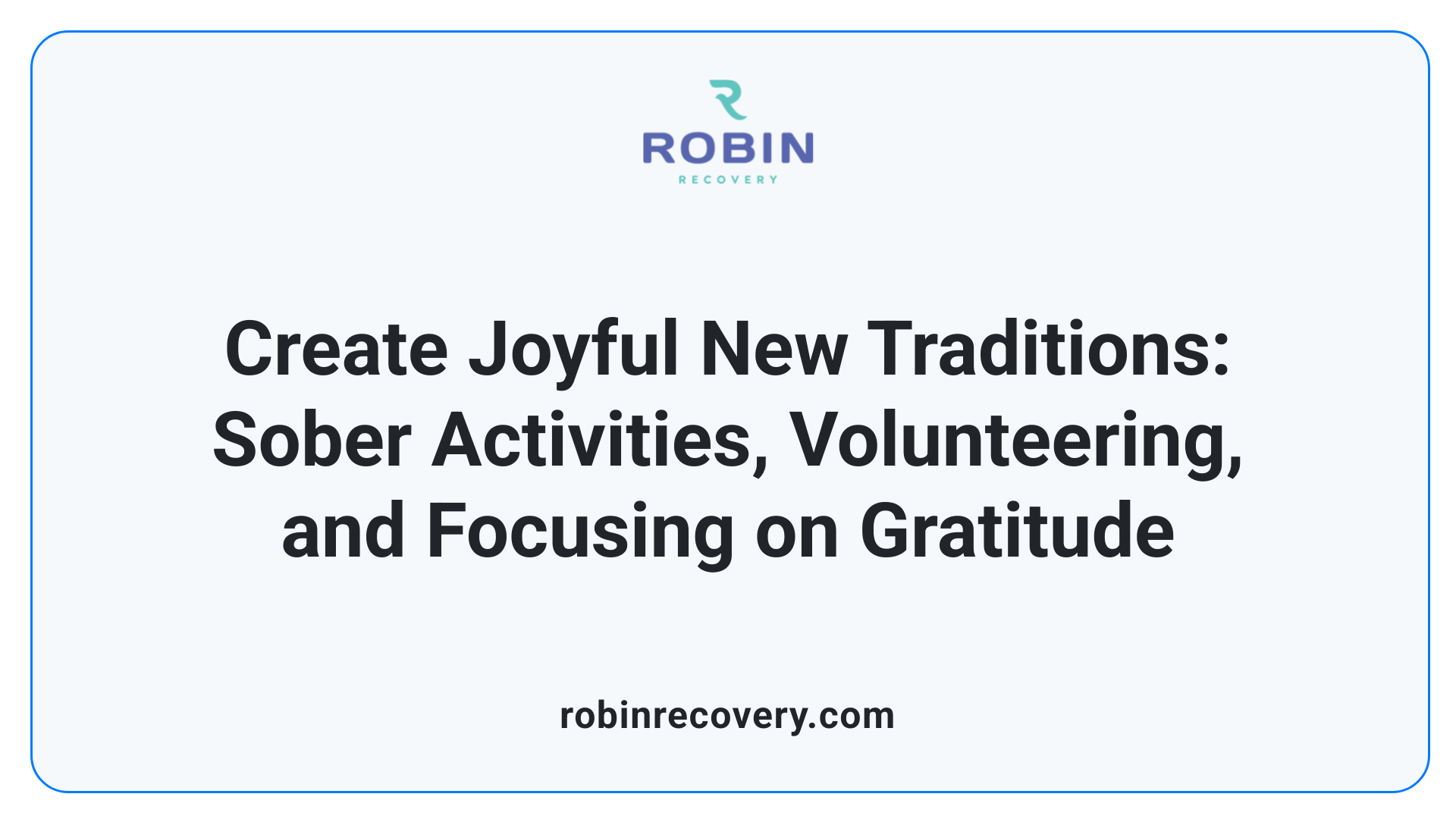How to navigate holidays and celebrations while maintaining sobriety

Embracing a Sober Holiday Season
Holidays and celebrations are often associated with socializing, joy, and, unfortunately, alcohol and substance use. For individuals in recovery, maintaining sobriety amid festive environments can be challenging but absolutely achievable. Preparation, support, and healthy coping strategies are key to navigating this special time while staying committed to sobriety.
Strategic Planning for a Sober Holiday

How can individuals maintain sobriety during holidays and festive occasions?
Maintaining sobriety during holidays requires thoughtful preparation and proactive strategies. A crucial first step is creating a comprehensive plan before attending events. This involves selecting which gatherings are safe and beneficial, setting time limits for participation, and identifying potential triggers such as stressful family interactions or environments where alcohol is prevalent.
Building a reliable support network is also essential. Support can come from friends, family members, sober contacts, or attendance at support group meetings. Sharing your intentions and plans with these individuals can offer accountability and emotional reinforcement.
Having a sober strategy includes carrying non-alcoholic beverages like sparkling water, tea, or mocktails to avoid temptation and convey your non-drinking stance confidently. Practicing refusal skills, such as politely declining drinks or social pressure, prepares you to handle peer interactions assertively.
Moreover, establishing clear boundaries—such as avoiding certain discussions or risky situations—helps protect your sobriety. Planning an exit strategy, like arranging transportation in advance or knowing how to leave early if feeling overwhelmed, allows you to prioritize your well-being without stress.
Engaging in alternative, sober-friendly activities during the holidays, like baking, volunteering, or crafting, shifts focus away from alcohol. Cultivating healthy habits such as mindfulness, exercise, and self-care reduces stress and lowers the risk of relapse.
In short, a well-thought-out plan that combines support, boundaries, enjoyable sober activities, and self-care increases resilience against holiday temptations, fostering a joyful and alcohol-free celebration experience.
Handling Social Pressures and Managing Triggers

During festive environments, managing social pressures and personal triggers is essential for maintaining sobriety. Proactive planning can make a significant difference. Before attending gatherings, set clear boundaries—such as bringing your own non-alcoholic beverages like sparkling water or tea, and preparing assertive responses like, "No, thank you," or "I'm not drinking this year." Having an exit strategy is also helpful; plan ways to leave early if the environment becomes overwhelming or tempting.
Recognizing personal triggers—such as stressful family conversations, certain environments, or specific individuals—is crucial. By identifying what could lead to cravings, you can develop tailored coping strategies to stay on track.
Mindfulness and grounding exercises are effective tools to stay calm amid potential stressors. Deep breathing, meditation, or focusing on gratitude can reconnect you with the present moment and reduce anxiety.
Creating healthy coping mechanisms, such as engaging in activities that divert attention from drinking, helps sustain sobriety. Hosting sober-friendly events or focusing on meaningful conversation and connection fosters positive experiences.
Building a support system—whether through recovery groups, trusted friends, or family members—provides reassurance and accountability. Sharing your sobriety with others at the event can garner understanding and encouragement.
Ultimately, by simplifying your environment, preparing responses, and practicing mindfulness, you can turn festive occasions into opportunities for joyful, alcohol-free living. Staying aware of personal limits and having strategies in place creates a safer space to enjoy the holiday season while maintaining your recovery goals.
Coping Strategies for Common Fears and Emotional Challenges
How can individuals address common fears about maintaining sobriety during holidays?
Holidays often bring unique emotional hurdles for those in recovery. To face these fears, planning ahead is essential. Developing a clear strategy for social events, such as bringing your own non-alcoholic drinks like soda, tea, or cider, can help you feel prepared.
Having an exit plan is also beneficial. Know when and how you can leave an event if feeling overwhelmed or tempted, and consider bringing a sober buddy for support. Sharing your sobriety with friends and hosts can foster understanding and accountability, making social situations easier to navigate.
Recognizing personal triggers, such as peer pressure, stressful conversations, or specific environments, enables you to practice coping skills like mindfulness, deep breathing, and stress management techniques. These practices can help calm nerves and reduce cravings.
Engaging in self-care routines—regular exercise, sufficient sleep, healthy eating, and activities that bring joy—strengthens emotional resilience, helping you stay connected to your recovery goals.
Support services are readily available; resources such as the SAMHSA National Helpline can connect you with local treatment options and community groups. This ongoing support can make a significant difference, especially during the stressful holiday season.
By preparing in advance, building a support network, and practicing healthy coping strategies, individuals can confidently face holiday fears and enjoy meaningful, sober celebrations.
Utilizing Support Networks and Community Resources
During the holiday season, access to support networks and community resources plays a crucial role in maintaining sobriety. One of the primary resources is SAMHSA’s National Helpline, available 24/7 at 1-800-662-HELP (4357). This free and confidential service offers treatment referrals and information tailored to address holiday-related stress, loneliness, or grief. Callers can receive guidance on local treatment facilities, support groups, and community organizations.
Support groups such as 12-step programs (like Alcoholics Anonymous) and various community organizations provide fellowship, understanding, and shared experiences. These groups are valuable every day, especially during festive seasons, as they foster connection and accountability. Many offer virtual meetings and downloadable resources such as coping tips, educational materials, and self-care ideas.
Building and maintaining a supportive network of friends, family, and sober contacts helps create a safety net during challenging times. Setting boundaries—such as selecting sober activities, bringing non-alcoholic drinks, and planning exit strategies—can prevent unwanted triggers. Having a relapse prevention plan and engaging in proactive planning for social events strengthens recovery efforts.
Other effective strategies include participating in community activities that focus on giving back, volunteering, or engaging in sober-friendly traditions. Regular self-care practices such as exercise, healthy eating, mindfulness, and gratitude exercises also support emotional resilience.
In summary, utilizing helpline services, engaging with support groups, fostering personal support systems, and employing healthy coping strategies collectively create a robust foundation for staying sober throughout the holidays.
Creating New Traditions and Sustaining Sobriety Joyfully

Hosting Sober Celebrations
Creating holiday traditions that don't involve alcohol can help maintain sobriety and bring a fresh sense of joy. Consider hosting gatherings centered around activities like baking contests, decorating cookies, or playing games. These activities divert attention from drinking and foster a festive atmosphere. Bringing non-alcoholic beverages such as hot cider, tea, or cocoa offers alternatives that keep the mood lively without temptations.
Volunteering and Giving Back
Engaging in acts of service during the holiday season can reinforce positive feelings and provide a sense of purpose. Volunteering at local shelters, participating in community drives, or helping neighbors can create meaningful connections and enrich your holiday experience. These activities shift focus away from drinking and towards kindness, gratitude, and community.
Focusing on Gratitude and Meaningful Activities
Practicing gratitude and engaging in joyful, sober-friendly activities can enhance your holiday experience. Consider creating new traditions like writing thank-you notes, reflecting on positive moments, or participating in meditation and mindfulness practices. These approaches help appreciate the present, reduce stress, and foster emotional resilience.
Creating a Positive Environment
Planning ahead and choosing supportive surroundings are crucial. Share your sobriety plans with friends or family who will respect and support your choices. Bring a sober buddy to events, have an exit strategy, and prepare responses to peer pressure. Emphasizing connection, personal growth, and community involvement makes holiday celebrations more fulfilling.
Strategy Description Benefit Hosting activities Sober contests, decorating, games Keeps focus on fun, distracts from drinking Volunteering Community service projects Builds community and purpose Practicing gratitude Reflecting on positive aspects, mindfulness exercises Enhances emotional well-being Planning ahead Travel plans, support contacts, exit strategies Prevents relapse, reduces stress Building new traditions Sober-focused events, giving back, new hobbies Creates lasting memories
Celebrating holidays without alcohol allows for more authentic and meaningful experiences, fostering resilience, connection, and personal growth while enjoying the season sober and wholeheartedly.
Thrive and Celebrate Respectfully
Holidays are a unique opportunity to reconnect with loved ones, reflect on personal growth, and embrace the joy of sobriety. With thoughtful planning, strong support systems, and a focus on healthy activities, individuals can navigate festive seasons confidently and joyfully. Turning the season into a celebration of resilience and authentic happiness not only strengthens recovery but also enriches relationships and personal well-being.
References
- National Helpline for Mental Health, Drug, Alcohol Issues | SAMHSA
- Holiday Gatherings in Recovery: Stay Sober & Manage Triggers
- 10 Tips to Combat Substance Use - Centerstone
- Tips for Sober Celebrating During the Holidays - Pine Rest Newsroom
- How to Stay Sober: Navigating the Holidays While In Recovery
- Tips for Staying Sober During the Holidays | Hazelden Betty Ford
- Top 5 Tips for Maintaining Sobriety During the Holidays
- Celebrating the Holidays Sober: A Guide for People in Recovery
- Holiday Gatherings in Recovery: Stay Sober & Manage Triggers
